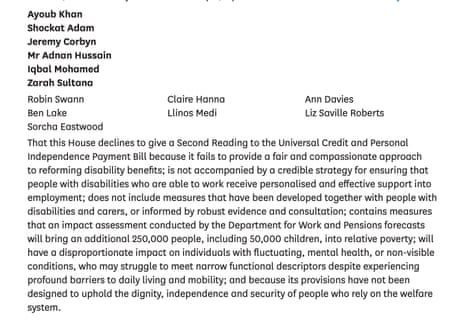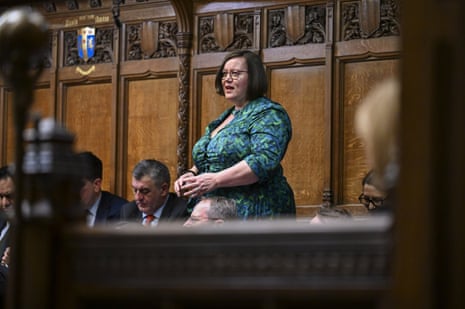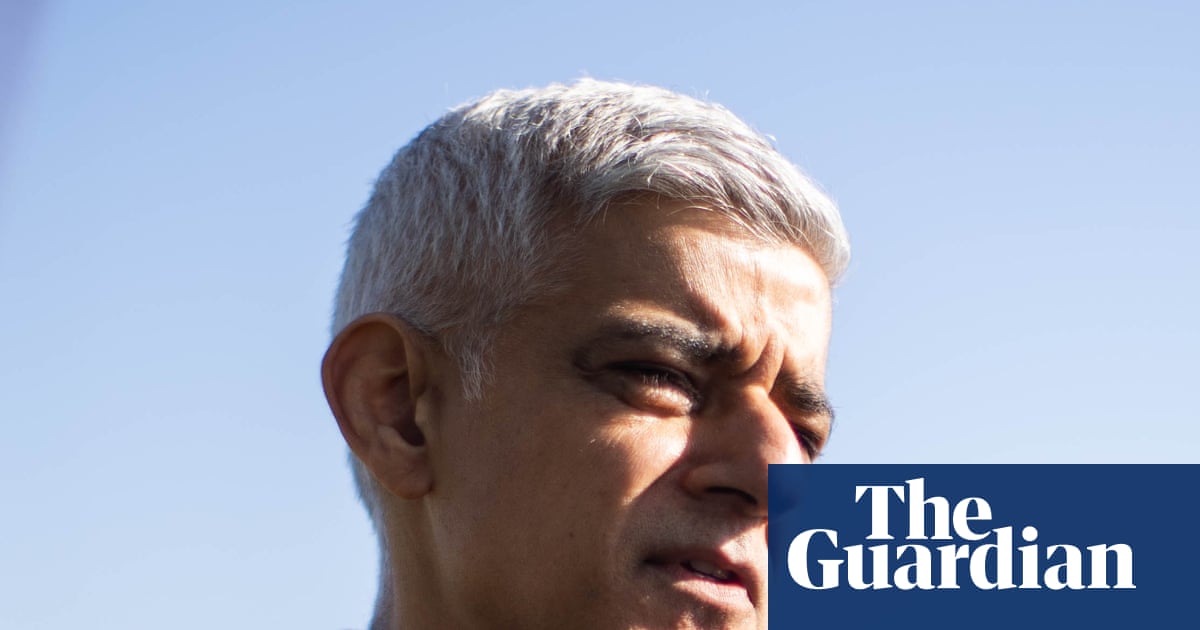No 10 rejects claim welfare U-turn shows PM caves under pressure, saying it shows this is 'government that listens'
At the lobby briefing the No 10 spokesperson also defended the welfare bill U-turn on the grounds it showed this was “a government that listens”.
Asked to respond to claims the reversal showed Keir Starmer does not “stand for anything”, the spokesperson replied:
It’s not unusual as part of the parliamentary process to introduce a bill, have a debate about the principles and then look at how those are implemented. Sometimes that’s with amendments along the way.
Asked if it was fair to say Keir Starmer always backed down if “enough people kick up a fuss”, the spokesman replied:
I don’t accept that. This is a government that listens.
Key events 17m ago Starmer says he 'deeply regrets' using 'island of strangers' line in immigration speech, but arson attack had distracted him 39m ago No 10 rejects claim welfare U-turn shows PM caves under pressure, saying it shows this is 'government that listens' 44m ago No 10 does not rule out tax rises, but says there will be no 'permanent increase in borrowing' to fund welfare U-turn 50m ago IFS says new Pip policy will create 'big differences' in what's paid to people with similar conditions before and after cut-off 1h ago What thinktanks say about what welfare bill U-turn will cost 1h ago Disability rights campaigners say they remain opposed to welfare bill, claiming U-turn creates 'two-tier system' 2h ago Lib Dems say they will continue to oppose welfare bill, despite U-turn, because it mean 'some of most vulnerable' losing help 2h ago Jeremy Corbyn joins Tories in saying welfare bill U-turn creates 'two-tier benefits system' 2h ago Green party urges Labour MPs to keep fighting welfare bill, saying even with U-turn it's still not 'humane' 3h ago Minister dismisses claim welfare U-turn sign of weakness, saying voters 'respond very positively to politicians listening' 3h ago Many Labour MPs will still vote against welfare bill despite U-turn, leftwinger Nadia Whittome claims 4h ago Curtice says Treasury needs £4bn to fund welfare bill and WFP U-turns, and taxes likely to go up 4h ago Welfare bill U-turn could cost Treasury around £3bn a year, Resolution Foundation head Ruth Curtice says 4h ago 'Good and workable compromise' - lead Labour rebel Meg Hillier's statement on why she's accepting U-turn 4h ago No 10 defends U-turn, saying 'we have listened to MPs worried about pace of change' 4h ago Full text of Liz Kendall's letter to Labour MPs confirming welfare bill U-turn 4h ago Starmer's 'humiliating U-turn' will create 'two-tier benefits system', Tories say Show key events only Please turn on JavaScript to use this feature
Starmer says he 'deeply regrets' using 'island of strangers' line in immigration speech, but arson attack had distracted him
Keir Starmer has said he “deeply regrets” claiming the UK risked becoming an “island of strangers” in an immigration speech that drew comparisons to the language of Enoch Powell, PA Media reports. PA says:
The prime minister said he had not been in the “best state” to give the press conference, in which he insisted on the need for tighter border controls, as he reeled from an alleged arson attack on his family home.
He said he had considered pulling out of the speech after the fire at the property in Kentish Town left him and his wife Victoria Starmer “really shaken up.”
The PM ended up going through with the conference as planned on 12 May, hours after the blaze.
In it, he warned Britain risked becoming “an island of strangers” without tougher immigration controls – rhetoric that sparked an immediate backlash and was denounced by critics, including within Labour ranks, as divisive.
At the time, Downing Street doubled down on the remarks and said Starmer “completely rejects” suggestions he had echoed Powell’s infamous “rivers of blood” speech that was blamed for inflaming racial tensions in the 1960s.
But in an interview for the Observer Starmer struck a more conciliatory tone, saying the language “wasn’t right”.
“I wouldn’t have used those words if I had known they were, or even would be interpreted as an echo of Powell,” he said.
“I had no idea – and my speechwriters didn’t know either. But that particular phrase – no – it wasn’t right. I’ll give you the honest truth: I deeply regret using it.”
He added: “It’s fair to say I wasn’t in the best state to make a big speech … I was really, really worried. I almost said: ‘I won’t do the bloody press conference.’
“Vic was really shaken up as, in truth, was I. It was just a case of reading the words out and getting through it somehow… so I could get back to them.”
Tom Baldwin, who wrote an acclaimed biography of Starmer, interviewed him for the Observer. It’s an excellent read. I’ll post more from it soon.
No 10 rejects claim welfare U-turn shows PM caves under pressure, saying it shows this is 'government that listens'
At the lobby briefing the No 10 spokesperson also defended the welfare bill U-turn on the grounds it showed this was “a government that listens”.
Asked to respond to claims the reversal showed Keir Starmer does not “stand for anything”, the spokesperson replied:
It’s not unusual as part of the parliamentary process to introduce a bill, have a debate about the principles and then look at how those are implemented. Sometimes that’s with amendments along the way.
Asked if it was fair to say Keir Starmer always backed down if “enough people kick up a fuss”, the spokesman replied:
I don’t accept that. This is a government that listens.
No 10 does not rule out tax rises, but says there will be no 'permanent increase in borrowing' to fund welfare U-turn
Downing Street has said there will be no permanent increase in government borrowing as a result of the welfare bill U-turn. Asked at the morning lobby briefing about how the concession would be funded, a No 10 spokesperson said:
There’ll be no permanent increase in borrowing, as is standard. We’ll set out how this will be funded at the budget, alongside a full economic and fiscal forecast in the autumn, in the usual way.
Asked if taxes might go up to fund the new policy, the spokesperson said:
As ever, as is a long-standing principle, tax decisions are set out at fiscal events.
IFS says new Pip policy will create 'big differences' in what's paid to people with similar conditions before and after cut-off
Although the Institute for Fiscal Studies and the Resolution Foundation agree on the cost of the welfare bill U-turn (see 11.55am), there is some difference in what they are saying about the fact that the changes will implement what has been called a “two-tier” system – with existing claimants getting more than someone applying with the same health condition once the new eligibility requirements kick in.
In an interview this morning, Ruth Curtice from the Resolution Foundation said anomalies like this were a routine feature of benefit policy reform. (See 9.40am.) But the IFS says, in its statement today, that this will create “big differences” in what is paid to disabled people with similar conditions, submitting claims at roughly the same time.
The IFS briefing says:
These two changes mean that the cuts are only on new claimants. This creates a large difference in treatment depending on the timing of disability onset. Take two people who develop the exact same health problems, but one develops them just early enough (before November 2026) to qualify as an ‘existing claimant’ and one just too late. The first is assessed for Pip and UC health element under the current rules and receives £8,930 in total – £3,850 from Pip and £5,080 from UC health element. The second is assessed under the new rules – because of the tighter criteria they do not qualify for Pip, and they receive the new lower UC health element, which after the freeze will be worth £2,370 (in today’s prices). If the government goes ahead with its proposed plans to scrap the work capability assessment, the second claimant would receive no specific support for health conditions at all. These differences would persist indefinitely, in some cases for many years.
And Tom Waters, an associate director at the IFS, said:
This [policy] will create big differences – thousands of pounds a year, for many years in some cases – between similar people with similar health conditions who happen to have applied at slightly different times.
What thinktanks say about what welfare bill U-turn will cost
The government has refused to say how much its welfare bill U-turn will cost, but the Institute for Fiscal Studies and the Resolution Foundation, the UK’s two leading public spending thinktanks have both issued statements providing costings. They are both saying the concessions will cost around £3bn a year (although there are some minor differences in the figures they are using).
In its analysis, the IFS says:
The initial benefit reforms would have saved the government £5.5bn by 2029–30. The revised package of reforms will save only £2.5bn, so will cost the government £3.0bn relative to its previous plans.
-The first change is to not apply the new, tighter assessment for existing claimants of personal independence payment (Pip) at the point of being reassessed. This is set to affect 370,000 current claimants in 2029–30, benefiting them to the tune of around £4,150 per year on average (in today’s prices). It will also indirectly benefit around 50,000 claimants of carer’s allowance who look after a Pip claimant, by £4,340 per year.
-The second change is to the universal credit (UC) health element, paid to those who have a condition that prevents them working. The previous plan had been to freeze this element for existing claimants and roughly halve, then freeze, it for most new claimants. The precise detail here is slightly ambiguous, but the new policy seems to be to no longer freeze the element for existing claimants (the halving and freezing for new claimants will continue). This will benefit 2.2 million claimants of the benefit in 2029–30 by £450 per year. Some will gain from both this and the Pip policy.
And in its analysis, the RF says:
These changes are welcome, but could cost between £2.6bn and £3.2bn a year in 2029-30 – making it even tougher for the Chancellor to meet her fiscal rules this autumn ….
The key change is that current Pip claimants will no longer lose support, even if they do not qualify for support under the new criteria (scoring at least four points in any single heading for the daily living component of the PIP test). Around 370,000 claimants are expected to have £4,500 protected, on average. This protection also has knock-on effects for their carers, who will continue to receive carers’ allowance. Taken together, this protection comes at a cost of £2.1bn in 2029-30.
The government has said existing recipients of the health element of UC will see support protected in real terms. This will insulate 2.25 million people from a loss of between £250 and £500 per year, and will cost between £540m and £1.1bn, depending on how it is implemented.
Overall, the changes announced today will cost between £2.6bn and £3.2bn in 2029-30 – reducing the gross savings from the original proposals from £8.1bn to as little as £4.9bn.
Disability rights campaigners say they remain opposed to welfare bill, claiming U-turn creates 'two-tier system'
Ministers seem to have failed to win over disability rights campaigners with the U-turn announced overnight.
Although Mencap, the learning disability charity, issued a relatively supportive comment about the changes agreed late yesterday, most the the disability charities or campaign groups commenting today have said they remain opposed to the bill.
James Taylor, director of strategy at disability equality charity Scope, said:
It is encouraging that the government is starting to listen to disabled people and MPs who have been campaigning for change for months. But these plans will still rip billions from the welfare system.
The proposed concessions will create a two-tier benefits system and an unequal future for disabled people.
“Life costs more if you are disabled. And these cuts will have a devastating effect on disabled people’s health, ability to live independently or work.
We urge government to properly engage with disabled people and MPs on how best to reform welfare and create an equal future.
Mikey Erhard, policy lead at Disability Rights UK, which describes itself as the country’s leading disability rights organisation, said:
We completely reject the imposition of the two-tier system on offer. It is not a massive concession to have a benefit system where future generations of disabled people receive less support than disabled people today. MPs must vote against this proposal.
By attempting to push through cruel cuts to the benefits of disabled people, the government prioritised balancing its books over improving the lives of disabled citizens. Now, it is negotiating political deals, again with no concern for the lives of disabled people.
Despite seemingly rowing back on some of the worst aspects of its plans, the government is still attempting to slash billions of pounds from a system that doesn’t provide enough support as it stands.
Charlotte Gill, head of campaigns and public affairs at the MS Society, said:
The government are finally being forced to reckon with the crisis that their proposed benefits cuts would present to disabled people, including many with MS. But instead of meaningful action, all they’re doing is kicking the can down the road and delaying an inevitable disaster.
Down the line, these cuts will still push more people into poverty and worsen people’s health. We urge MPs not to be swayed by these last ditch attempts to force through a harmful bill with supposed concessions. The only way to avoid a catastrophe today and in the future is to stop the cuts altogether by halting the bill in its tracks.
And a joint statement from Disabled People Against Cuts, Mad Youth Organise, Disability Rights UK, National Survivor User Network and Crips Against Cuts said:
Disabled people and disability rights groups totally reject the performative politics being enacted by the government, in response to being challenged by a growing MP rebellion and a tidal wave of anger from the public.
We will not sell out generations of disabled people past and future by accepting this sham of alleged concessions on welfare spending so that they can save face. The reforms are ill thought out, and MPs still do not have a full understanding of their implications and impact.
Lib Dems say they will continue to oppose welfare bill, despite U-turn, because it mean 'some of most vulnerable' losing help
Like the Green party (see 10.31am), the Independent Alliance (see 11am) and some Labour MPs (see 9.50am), the Liberal Democrats are saying the U-turn does not go far enough, and that the UC and Pip bill should not be allowed to go ahead on Tuesday.
Steve Darling, the Liberal Democrats’ welfare spokesperson, said:
It should not have taken a major rebellion for the government to realise that these cuts would cause immense damage to some of the most vulnerable and risk creating a false economy by actually forcing some people out of work.
The government should still pull this bill before the vote on Tuesday and go back to the drawing board. In the absence of any impact assessment, MPs still do not have the full facts and those who are affected have still not been consulted on these changes.
Liberal Democrats will continue to oppose this bill that risks stripping thousands of carers of vital assistance and leaving some of the most vulnerable without support.
Jeremy Corbyn joins Tories in saying welfare bill U-turn creates 'two-tier benefits system'
Jeremy Corbyn, the former Labour leader who acts as a spokesperson for the five-strong Independence Alliance group of independent MPs, has put out a statement saying he and his colleagues still regard the welfare bill as unacceptable. He says:
The government has announced a two-tier benefits system.
Under its plans, you can keep your benefits if you are disabled now, but not if you become disabled tomorrow. How is that fair?
A reminder: The Independent Alliance stands by its own amendment, and we will not back down.
Here is the Independent Alliance’s reasoned amendment opposing the bill.

In using the phrase “two-tier benefits system”, Corbyn is using the same line of attack as the Conservatives. (See 8.30am.) They are both making the point that, under these plans, someone getting Pip now may get more than someone with the same disability who makes an application after the eligibility rules have been tightened.
But this is true of most changes to benefits, or any other state entitlement, as ministers and experts have said this morning. (See 9.40am and 10.19am.) Matthew Holehouse from the Economist has been criticising the argument on Bluesky.
It’s such a cheap and weak critique: policy reforms are invariably “two tier” in that they treat future cohorts differently to current cohorts. (See: tuition fees; pension entitlement; paternity leave; 1000 other examples). The only critique is: is the future regime the right one.
The answer to that in this case may be no, in which case the Tories should prosecute that argument
Green party urges Labour MPs to keep fighting welfare bill, saying even with U-turn it's still not 'humane'
The Green party says it is still opposed to the UC and Pip bill, despite the U-turn. In a statement the Green MP Siân Berry said:
The responsibility is now with other Labour MPs to stand firm in the face of this inadequate offer. Political pressure means a reprieve for some who were set to be cruelly harmed, but this will leave disabled people, young people and those who will become sick and injured in the future, high and dry.
The prime minister should withdraw the Bill, take some considerable time to consult with disabled people and come back with something humane and workable.
Minister dismisses claim welfare U-turn sign of weakness, saying voters 'respond very positively to politicians listening'
Stephen Kinnock, the care minister, was the government voice on the airwaves this morning. Here are the main points he made about the welfare bill U-turn.
-
Kinnock rejected claims that the U-turn was a sign of weakness. When it was put to him on the Today programme that this move, coming after the U-turns on winter fuel payments and a national inquiry into grooming gangs, showed that if Keir Starmer was pushed, he would give in, Kinnock replied:
I think if you talk to people out there in the country, they respond very positively to politicians listening, engaging, recognising that you don’t get everything right from day one every time, and making the adjustments and the changes that are needed.
And this prime minister will always put the country first. He puts country before party, and he does the right thing for the country.
-
He defended having a “staggered” approach to changing benefit rules. Asked about the Tory claim that the government was creating a “two-tier benefits system” (see 8.30am), he replied:
Whenever you bring forward change to a complex system, you always have to decide between do you make the change for everybody that’s in that system, in one big move, or do you do it in a more staggered way? What’s clear from the announcement today is that it’s going to be a more staggered process.
-
He declined to say how much the U-turn would cost. He told Times Radio:
The full details around what we are laying out, what I’ve summarised really today, is going to be laid out in parliament, and then the chancellor will set out the budget in the autumn the whole of the fiscal position and this will be an important part of that.
-
He said he was now confident that the UC and Pip bill will pass its second reading on Tuesday.
Many Labour MPs will still vote against welfare bill despite U-turn, leftwinger Nadia Whittome claims
Many Labour MPs will continue to oppose the welfare bill despite the U-turn announced overnight, the leftwing MP Nadia Whittome claimed this morning.
Whittome told the Today programme:
All of the MPs I’ve spoken to who signed the reasoned amendment – MPs from across the party, not just on the left – are sticking to their position because we understand that we are answerable to our constituents.
If the government doesn’t pull the bill, doesn’t consult properly with disabled people and come back to MPs with a serious proposal that protects the dignity of disabled people, I will vote against and I will be far from the only one.
I think MPs who were around in 2015 who followed the party’s instruction and abstained on the second reading of the Tories’ welfare bill are particularly clear-minded about this because they say that is the biggest regret of their political lives.
Whittome is one of around 20 Labour MPs who are openly leftwing, or even Corbynite. Some of the MPs in that faction are either currently suspended, or have been suspended in the past, for rebelling over policy.
The Tories say the welfare bill changes will create a “two-tier benefits system”. (See 8.30am.) Ruth Curtice, chief executive of the Resolution Foundation, said this was not unusual when welfare policy is changing. She said:
It’s certainly the case you will have two recipients with the same scores on Pip assessments, one will be eligible and one won’t under this system for a period of years.
On the other hand, it is not unusual to introduce changes to the disability benefits system this way, where there are some more protections for existing recipients and that is not just a political question, I think it is also the case that losing substantial amounts of money can have a bigger impact on families.
Curtice says Treasury needs £4bn to fund welfare bill and WFP U-turns, and taxes likely to go up
In her Today interview Ruth Curtice, chief executive of the Resolution Foundation, said she thought taxes would have to go up to help fund the welfare bill U-turn. She explained:
They’ll have to find this £3bn. (See 9.12am.)
We also had the announcement on winter fuel [the winter fuel payments U-turn] which costs over another £1bn. So altogether they’re looking for over £4bn.
They also have completed their spending review, which means that spending totals for departments are set, and revisiting that will be very difficult.
Presumably, after this, looking for further changes from savings from the welfare budget would be quite challenging.
So that leaves only extra borrowing, which the chancellor doesn’t have much space for, unless she were to change her own fiscal rules, or tax rises.
When asked to confirm that this meant tax rises were inevitable, Curtice replied:
Yes, unless the government were to get better news on the economy the next time that the Office for Budget Responsibility does a forecast, which would be in the autumn.
But when we look at everything that’s happened in the world since they last did that on March, our estimate is that she’ll actually get bad news from the OBR as well.
Welfare bill U-turn could cost Treasury around £3bn a year, Resolution Foundation head Ruth Curtice says
Ruth Curtice, a former Treasury official how now runs the Resolution Foundation, a thinktank focusing on cost of living issues, told the Today programme that the welfare bill U-turn could cost the Treasury about £3bn a year. She explained:
The Institute for Fiscal Studies said [it would cost] £1.5bn yesterday on the Pip changes. I think it’s more like £3bn: you have the changes to Pip which cost £1.5bn to £2bn when you also take into account consequentials for things like carer’s allowance, but they’ve also said the freeze that they were going to introduce on universal credit health-related support will be undone and that will now rise in real terms and we estimate that will cost another £1bn.
Meg Hillier, who tabled the reasoned amendment backed by more than 120 Labour MPs that would have killed the UC and Pip bill (see 8.46am), told the Today programme that welfare bill debacle showed that Downing Street should have listened more to its backbenchers. She said:
I think there’s huge talent, experience and knowledge in parliament, and it’s important it’s better listened to, and I think that message has landed.
I’m really blown away by the talent of my new colleagues in particular, because I didn’t know them before the election.
Their knowledge and experience was really helpful, and they know a lot about this subject, and I think if they’d been listened to better, we might have been in a better place.
'Good and workable compromise' - lead Labour rebel Meg Hillier's statement on why she's accepting U-turn
Meg Hillier, chair of the Commons Treasury committee, was MP who tabled the reasoned amendment that would have killed the UC and Pip bill. She was working with other Labour select committee chairs, but as the lead signatory she was effectively leader of the reasoned amendment rebels.
Overnight she issued this statement explaining why she is accepting the government’s concessions. She said:
This is a positive outcome that has seen the government listen and engage with the concerns of Labour MPs and their constituents.
It’s encouraging that we have reached what I believe is a workable compromise that will protect disabled people and support people back into work while ensuring the welfare system can be meaningfully reformed.
This means that disabled people currently in receipt of Pip and the health element of universal credit will continue to receive the same level of support.
That future changes to disability support will be co-produced with disabled people, building on the work of Minister Stephen Timms MP to create a system that involves disabled people in decisions about their lives.
And that employment support will be brought forward and substantially improved so that people who want to work are not trapped in the benefit system.
This is a good and workable compromise and shows that the Labour government has listened and that working together with Labour MPs can move forward to support vulnerable disabled people, reform the welfare system in a just and inclusive way and contribute towards the economic growth and prosperity this country so desperately needs.

No 10 defends U-turn, saying 'we have listened to MPs worried about pace of change'
Here is the statement issued by Downing Street overnight about the U-turn. A No 10 spokesperson said:
We have listened to MPs who support the principle of reform but are worried about the pace of change for those already supported by the system.
This package will preserve the social security system for those who need it by putting it on a sustainable footing, provide dignity for those unable to work, supports those who can and reduce anxiety for those currently in the system.
Our reforms are underpinned by Labour values and our determination to deliver the change the country voted for last year.
Full text of Liz Kendall's letter to Labour MPs confirming welfare bill U-turn
Liz Kendall, the work and pensions secretary, explained the changes to the bill in a letter to Labour MPs. The full text became available overnight. For the record, here it is in full.
In the letter Kendall says the changes will “strengthen the bill” – which is a novel way of describing a humiliating U-turn, but true in the sense that the bill will now be strong enough to get through the Commons.
Dear colleague,
We have always said we are determined to reform the social security system so it is fair, provides dignity and respect for those unable to work, supports those who can, and is sustainable so it is there for generations to come.
The broken system we inherited from the Tories fails all of those tests.
These important reforms are rooted in Labour values, and we want to get them right.
We have listened to colleagues who support the principle of reform but are worried about the impact of the pace of change on those already supported by the system.
As a result we will make two changes to strengthen the bill.
Firstly, we recognise the proposed changes have been a source of uncertainty and anxiety.
Therefore, we will ensure that all of those currently receiving Pip will stay within the current system. The new eligibility requirements will be implemented from November 2026 for new claims only.
Secondly, we will adjust the pathway of universal credit payment rates to make sure all existing recipients of the UC health element – and any new claimant meeting the severe conditions criteria – have their incomes fully protected in real terms.
Colleagues rightly want to ensure that disabled people and those with ill health are at the heart of our reforms.
We will take forward a ministerial review of the Pip assessment, led by the minister for social security and disability [Stephen Timms], to ensure the benefit is fair and fit for the future.
At the heart of this review will be coproduction with disabled people, the organisations that represent them, and MPs so their views and voices are heard. The review will then report to me as work and pensions secretary.
These commitments sit alongside our raising of the standard rate of the universal credit – the biggest real-terms permanent increase of any benefit since the 1980s – the protection of the incomes of the most vulnerable who will no longer be reassessed and the introduction of “right to try”.
Our reform principles remain; to target funding for those most in need and make sure the system is sustainable for the future to support generations to come.
We believe those who can work, should, and those who cannot, should be protected.
We will front load more of the additional funding generated by these reforms for back to work support for sick and disabled people.
Taken together it is a fair package that will preserve the social security system for those who need it by putting it on a sustainable footing, support people back into work, protect those who cannot work and reduce anxiety for those currently in the system.
Thank you to colleagues for engaging with us on these important reforms to social security.
Kendall does not say in this letter how much the U-turn will cost.
And she does not say what will happen to the bill that is getting its second reading on Tuesday. The changes to the health element of universal credit are on the face of the bill. The text cannot be changed before Tuesday, and so Labour MPs will have to vote for the bill on the basis of assurances that the government will rewrite large chunks of it with amendments the following week. Those amendments are not yet available.
Starmer's 'humiliating U-turn' will create 'two-tier benefits system', Tories say
Good morning. Political journalism, like all reporting, has a weakness for cliche and at Westminster there seems to be an unofficial rule that any use of the word U-turn must be proceeded by the adjective “humiliating”. The problem with this is that most U-turns are only mildly embarrassing, and turn out to be tactically advantageous. But this time – by accident or design – the Tories do seem to be using the word appropriately.
No 10 has performed a colossal U-turn on the universal credit (UC) and personal independence payment (Pip) bill, the legislation that will slash sickness and disability benefits. It was only confirmed in the early hours this morning, in an exchange of letters. Kiran Stacey has the details here.
In welfare matters, many policy decisions are motivated by the need to reduce costs decades ahead and that was always one of the main aims of this bill (as the Institute for Fiscal Studies analysis yesterday pointed out). The bill still functions as a long-term, cost-saving measure.
But it was also intended to save money for the Treasury during this parliament. In that respect, the bill has been more or less gutted. For Rachel Reeves, the chancellor, this is a disaster.
The U-turn has various big consequences, about which we will learn more today.
-
Keir Starmer now seems to have guaranteed that the UC and Pip bill will pass on Tuesday night – but the rebellion will not disappear entirely. Some Labour MPs are still planning to vote against.
-
Reeves is now under more pressure than ever to raise taxes in the autumn budget.
-
People who will need sickness and disability benefits in the future are still due to lose out, by significant amounts, compared to what they might get if they were claiming benefits now. Ministers will still have huge difficulty defending this. The Tories are accusing the government of creating a “two-tier benefits system”.
-
Keir Starmer’s authority in his party has been badly damaged. We can’t tell yet how significant this will turn out to be, but his personal approval ratings have collapsed since the general election and, at the very least, this will make recovery harder.
Back to “humiliating U-turn”, and this is what the Conservatives said about the move in a statement early this morning. Helen Whately, the shadow work and pensions secretary, said:
This is another humiliating U-turn forced upon Keir Starmer.
With the sickness benefits bill set to reach £100bn by 2030 the country needs action. But Labour has lurched from a bad plan to a next-to-nothing plan.
The latest ‘deal’ with Labour rebels sounds a lot like a two-tier benefits system, more likely to encourage anyone already on benefits to stay there rather than get into work.
We made a serious offer to Keir Starmer in the national interest if he was willing to grip the challenge of getting the welfare bill down and more people into work - making savings to avoid putting up taxes. But instead, he’s done yet another U-turn.
Here is the agenda for the day.
10.05am: Keir Starmer is expected to speak at the Welsh Labour conference in Llandudno.
Morning: Kemi Badenoch is on a visit in Essex.
11.30am: Downing Street holds a lobby briefing.
If you want to contact me, please post a message below the line when comments are open (normally between 10am and 3pm at the moment), or message me on social media. I can’t read all the messages BTL, but if you put “Andrew” in a message aimed at me, I am more likely to see it because I search for posts containing that word.
If you want to flag something up urgently, it is best to use social media. You can reach me on Bluesky at @andrewsparrowgdn.bsky.social. The Guardian has given up posting from its official accounts on X, but individual Guardian journalists are there, I still have my account, and if you message me there at @AndrewSparrow, I will see it and respond if necessary.
I find it very helpful when readers point out mistakes, even minor typos. No error is too small to correct. And I find your questions very interesting too. I can’t promise to reply to them all, but I will try to reply to as many as I can, either BTL or sometimes in the blog.

.png) 2 months ago
38
2 months ago
38

















































